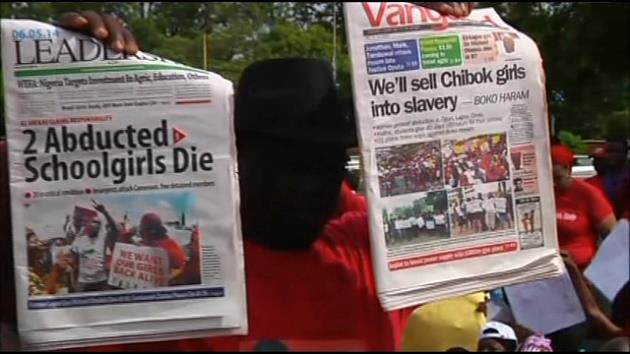By MICHELLE FAUL and ANDREW MELDRUM
Associated Press
LAGOS, Nigeria (AP) — Islamic militants who have triggered international outrage over the kidnapping of more than 270 Nigerian schoolgirls opened fire on a busy marketplace, killing hundreds of people in a new spasm of violence in the country’s northeast.
The attack escalates Nigeria’s growing crisis from a campaign of bombings, massacres and abductions being waged by the Boko Haram terrorist network in its campaign to impose an Islamic state on Africa’s most populous nation.
As many as 300 people were killed in the assault late Monday on the town of Gamboru Ngala on Nigeria’s border with Cameroon. The extremists opened fire on a marketplace bustling with shoppers taking advantage of the cooler nighttime temperatures in the semi-desert region, then rampaged through the town for 12 hours, setting houses ablaze and shooting those who tried to escape.
The attack and hundreds of casualties were confirmed by Borno state information commissioner Mohammed Bulama, who spoke to The Associated Press by telephone Wednesday.
Nigerian federal Senator Ahmed Zannah blamed fighters of the Boko Haram terrorist network that has claimed responsibility for the April 15 kidnapping of 276 teenage girls from their boarding school in Chibok, in northeastern Borno state. The insurgents threatened to sell the young women into slavery in a video seen by AP.
Outrage over the missing girls and the government’s failure to rescue them brought angry Nigerian protesters into the streets this week in an embarrassment for the government of President Goodluck Jonathan, who had hoped to showcase the country’s emergence as Africa’s largest economy as it hosted the Africa meeting of the World Economic Forum, the continent’s version of Davos.
Offers of international assistance have poured in, with the Obama administration announcing Tuesday it was sending personnel and equipment to help Nigerian security forces in their search for the girls in the vast Sambisa Forest. Jonathan confirmed that he has accepted the American assistance, which the Pentagon said Wednesday will help with communications, logistics and intelligence planning, but will not include any military operations.
Britain and China announced Wednesday that Nigeria has accepted their offers of help, and France said it was sending in a “specialized team” to help with search and rescue of the girls.
“In the face of such an appalling act, France, like other democratic nations, must react,” French Foreign Minister Laurent Fabius said. “This crime will not go unpunished.”
Fabius gave no details, except to say the team was being drawn from forces already in the region. France has soldiers in Niger, Cameroon and Mali, where it is fighting Islamic insurgents, as well as in Central African Republic.
The kidnapping has ignited a viral social media campaign under the hashtag (hash)BringBackOurGirls that has brought renewed attention to Boko Haram’s campaign of violence. On Wednesday, first lady Michelle Obama joined in, tweeting, “Our prayers are with the missing Nigerian girls and their families. It’s time to (hash)BringBackOurGirls.”
Boko Haram’s 5-year-old Islamic uprising has claimed the lives of thousands of Muslims and Christians, including more than 1,500 people killed in attacks so far this year. The group, whose name means “Western education is sinful,” has tried to root out Western influence by targeting schools, as well as attacking churches, mosques, government buildings and security forces in the country of 170 million, divided between a predominantly Christian south and Muslim north.
The homegrown terror group was largely contained to the northern part of Nigeria before expanding its reach with the help of al-Qaida in the Islamic Maghreb, the terrorist network’s affiliate in West Africa, which took in Boko Haram fighters for training in its camps in southern Somalia, beginning in 2010.
The spiraling violence “has become really extreme and is pushing Nigeria toward a critical phase,” said Elizabeth Donnelly, Nigeria analyst at Chatham House, an institute on international affairs in London.
“The steady escalation of Boko Haram’s violence continues. … They have widened their targets indiscriminately to include civilians, markets and schools. Now basically anybody is a target,” she said.
This has mobilized Nigerian public opinion.
“Now all Nigerians feel they are involved. Civil society is beginning to coalesce over the plight of the kidnapped girls and in opposition to the violence by Boko Haram and to abuses committed by the military,” Donnelly said. “This puts pressure on the government and it also puts pressure on Boko Haram.”
If the search for the students is successful and they are released, it could help find a way to bring the extremist violence under control, she said.
“But if things do not go well, if there is a negative outcome, Nigeria could find that the violence exacerbates,” she said. “The country could find itself in an even more severe crisis. All sides must be mindful that action and engagement has consequences.
Copyright 2014 The Associated Press. All rights reserved. This material may not be published, broadcast, rewritten or redistributed.

